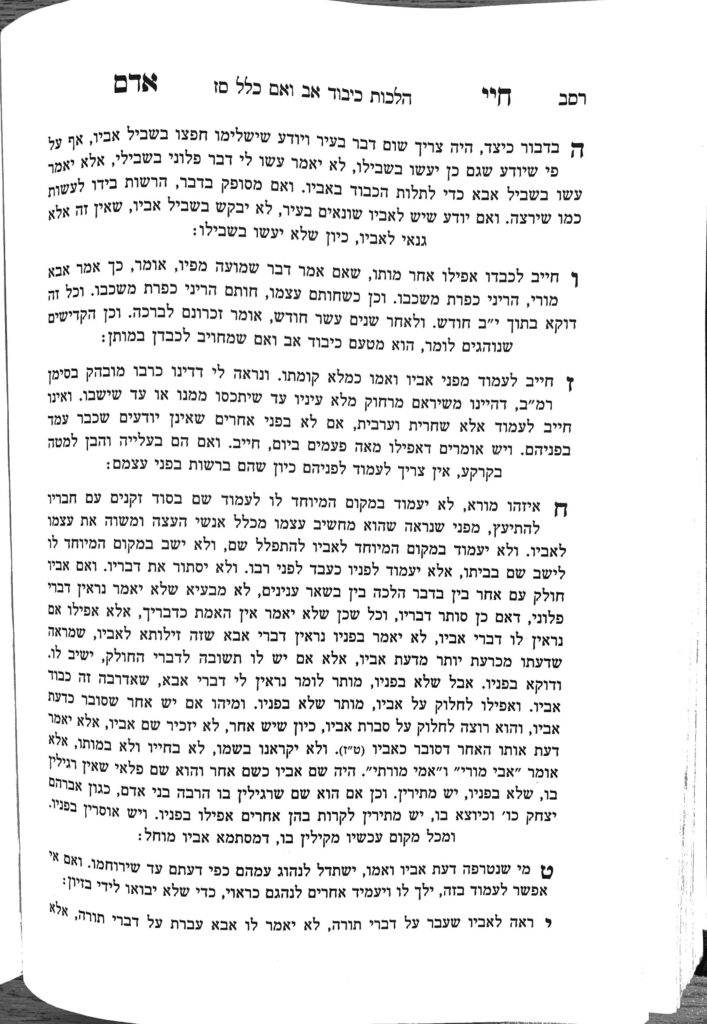We are beginning siman 6. The Chayei Adam writes that the chiyuv kavod to parents does not only apply when they are alive, but after they die as well. We see from the Chayei Adam that the chiyuv kibbutz av v’eim is not solely bein adam l’chaveiro; if it were, it would not apply once the parent is no longer around. Rather, there is a part of the chiyuv which is bein adam l’atzmo, that an individual must demonstrate hakaras hatov. Rav Wolbe points out that the concept of hakaras hatov is more related to realms of bein adam l’atzmo rather than bein adam l’chaveiro, because hakaras hatov is not about demonstrating gratitude inasmuch as it is feeling internal feelings of gratitude (which propel a person to act accordingly).
The Chayei Adam writes that there are a few ways to demonstrate kavod after one’s parents die. If a person shares a teaching from their father, they should stress that they learned the idea from their father and teacher. Within the first 12 months of their passing, they should add the phrase hareini kaparas mishkavo. Similarly, whenever one signs their name within the first 12 months of their parent’s passing, they should append hareini kaparas mishkavo to their name. During the first 12 months after a person dies, their neshama is going through a process of tahara in gehennom. A child gives back to their parent by saying hareini kaparas mishkavo, meaning that they wish they could take the pain of gehennom off of the parent and place it upon themselves. The Chayei Adam points out that hareini kaparas mishkavo is added both in speech and in writing.
Rav Chaim Palagi points out that the minhag has become to refrain from this concept, but he does not understand why. Thus, although many no longer practice it, it is still appropriate to do so.
After 12 months have passed, one should no longer say hareini kaparas mishkavo, because it would imply that the parent is still in gehennom. Only reshaim gemurim remain in gehennom for longer than 12 months, so it is no longer appropriate to say it. Rather, one should append the phrase zichrono/zichrona livracha. We know that just mentioning the name of a tzadik can be a source of bracha, so one shows kavod to their parents by associating them with bracha. By mentioning their name and wishing that they be a source of bracha, they are showing kavod to their parents after death.
Additionally, a person recites kaddish for the first year, and on the yahrzeit, as a part of kibbud av v’eim. If there are multiple people in a shul who are within the year of their parent’s death, they often work out a rotation for davening for the amud. If, in the same shul, one of the niftarim has only one son reciting kaddish, while the others have multiple sons reciting kaddish, one could argue that the rotation should be based on niftarim, not on aveilim, so that each niftar will receive an equal amount of zechusim. However, we do not divide it by niftarim, but rather by aveilim, because the primary idea behind davening from the amud when in aveilus is for the child to demonstrate kibbud av v’eim, not to accrue zechusim for the niftar. Hence, each aveil has an equal responsibility of kibbud av v’eim to their parent, so we split it between the aveilim.
Summary
- Kibbud av v’eim applies after a parent dies as well. One demonstrates kavod within the first 12 months by appending the phrase hareini kaparas mishkavo after mentioning their parent’s name, and by reciting kaddish.
- After 12 months, a person appends the phrase zichrono livracha after mentioning their parent’s name.
- Whenever a person mentions something they learned from their parents, they should stress that they learned the idea from their parents.



